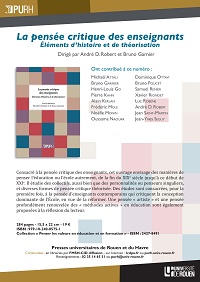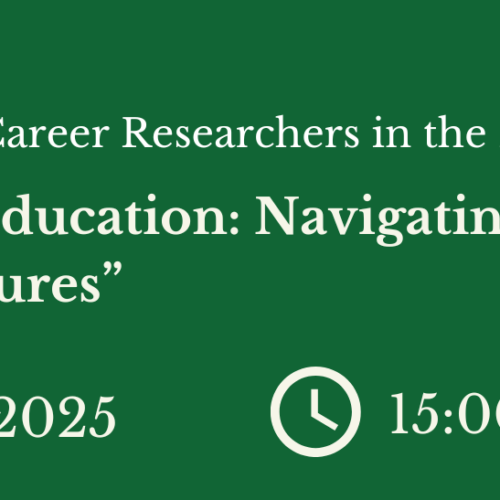Teachers Critical Thinking (2010-2015)
Convenor: André Robert (andre.robert@univ-lyon2.fr)
The work of the Teachers Critical Thinking SWG has resulted in the publication La Pensée critique des enseignants: Éléments d’histoire et de théorisation edited by André Robert and Bruno Garnier (University Press of Rouen, 2015).
The Teachers’ Critical Thinking SWG 2015 Annual Report is available here.
The Teachers’ Critical Thinking SWG 2014 Annual Report is available here.
Description: The concept of critical thinking tackled in this standing working group should be understood in a stronger sense that just protests and claims made through the channel of ordinary trade unions and political parties (though unions and parties can sometim es be relays of such a thought). By thought, we understand a kind of discourse that is part of a true intellectual and rational development, giving consistency or even a form of logic system, to arguments and ideas (around operations of conceiving, judging, reasoning) – and not just opinions, even coming from particular individuals or groups. In coordination with this definition, “critical” refers to the tendency of a mind that does not allow any statement without having experienced the rational legitimacy, testing various discursive proposal with discriminant reason (the Greek verb crinein, from which come the verb ‘criticize’ and the noun ‘crisis’, meaning originally to sort). The construction of the distance and externality, provided they comply with the requirements of rational argument, is thus the foundation of critical thought, in the sense meant by Theodor Adorno: “When the culture is accepted in its entirety, it has lost the ferment of its truth, which is negation” (Adorno, 1955, 1986). Critical thinking in the teaching world will be considered in several senses: -thinking from teachers and/or educationalists as unique individuals; -thinking coming from teachers organizations, networks, think thanks or groups operating as “collective intellectual” (Bourdieu, 2001); -thinking from outside personalities influencing the world of teachers in one way or another; -educational thought in a more generic sense, impacting the teaching practice. It will consider original examples of critical thinking, justified along the previous guidelines, or at least revisited at an original angle.
es be relays of such a thought). By thought, we understand a kind of discourse that is part of a true intellectual and rational development, giving consistency or even a form of logic system, to arguments and ideas (around operations of conceiving, judging, reasoning) – and not just opinions, even coming from particular individuals or groups. In coordination with this definition, “critical” refers to the tendency of a mind that does not allow any statement without having experienced the rational legitimacy, testing various discursive proposal with discriminant reason (the Greek verb crinein, from which come the verb ‘criticize’ and the noun ‘crisis’, meaning originally to sort). The construction of the distance and externality, provided they comply with the requirements of rational argument, is thus the foundation of critical thought, in the sense meant by Theodor Adorno: “When the culture is accepted in its entirety, it has lost the ferment of its truth, which is negation” (Adorno, 1955, 1986). Critical thinking in the teaching world will be considered in several senses: -thinking from teachers and/or educationalists as unique individuals; -thinking coming from teachers organizations, networks, think thanks or groups operating as “collective intellectual” (Bourdieu, 2001); -thinking from outside personalities influencing the world of teachers in one way or another; -educational thought in a more generic sense, impacting the teaching practice. It will consider original examples of critical thinking, justified along the previous guidelines, or at least revisited at an original angle.


